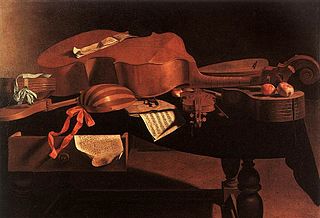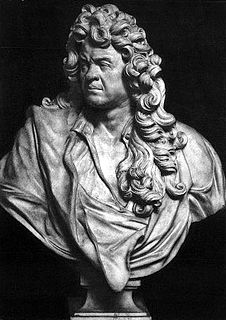
Michel Richard Delalande [de Lalande] was a French Baroque composer and organist who was in the service of King Louis XIV. He was one of the most important composers of grands motets. He also wrote orchestral suites known as Simphonies pour les Soupers du Roy and ballets.
The year 1684 in music involved some significant events.

Jean-Joseph de Mondonville, also known as Jean-Joseph Cassanéa de Mondonville, was a French violinist and composer. He was a younger contemporary of Jean-Philippe Rameau and enjoyed great success in his day. Pierre-Louis Daquin claimed: "If I couldn't be Rameau, there's no one I would rather be than Mondonville".

Christophe Rousset is an internationally renowned French harpsichordist and conductor, specializing in the performance of baroque music on period instruments. He is also a musicologist, with a passion for opera and European music of the 17th and 18th centuries, and is the founder of the French music ensemble Les Talens Lyriques.

Les Arts Florissants is a Baroque musical ensemble in residence at the Théâtre de Caen in Caen, France. The organization was founded by conductor William Christie in 1979. The ensemble derives its name from the 1685 opera by Marc-Antoine Charpentier. The organization consists of a chamber orchestra of period instruments and a small vocal ensemble. Current notable members include soprano Danielle de Niese and tenor Paul Agnew, who has served as assistant conductor since 2007. Jonathan Cohen is also on the conducting staff. Christie remains the organization's Artistic Director.

Acis et Galatée is an opera by Jean-Baptiste Lully. Unlike most of his operas, which are designated tragédies en musique, Lully called this work a pastorale-héroïque, because it was on a pastoral theme and had only three acts compared to the usual five. Otherwise, there is little musically or dramatically to distinguish it from Lully's tragédies.
The French musical ensemble Les Talens Lyriques was created in Paris, France, in 1991 by the harpsichordist and orchestral conductor Christophe Rousset. This instrumental and vocal formation derives its name from the subtitle of Les fêtes d'Hébé (1739) an opera by Jean-Philippe Rameau.

Henri Dumont was a baroque composer of the French school, born in the Southern Netherlands.

The King is Dancing is a 2000 costume drama by Belgian filmmaker Gérard Corbiau based on Philippe Beaussant's biography of Jean-Baptiste Lully, Lully ou le musicien du soleil (1992). The film, presenting libertine and pagan Lully as a natural ally of the early Enlightenment figure Louis XIV of France in his conflicts with the Catholic establishment, focuses on Lully's personal relationship with the King, as well as his camaraderie with Molière and rivalry with Robert Cambert.
Louise 'Louison' Moreau was a French operatic soprano who belonged to the Académie Royale de Musique, also a popular celebrity commonly referred to as one of the filles de l'opéra.
Jean-Baptiste Boësset was a French composer of sacred and secular music, whose notable works include an Ave Regina and several airs de cour. He was the eldest son of the court composer Antoine Boësset.
La Chapelle Royale is a French ensemble of baroque music.
Hervé Niquet is a French conductor, harpsichordist, tenor, and the director of Le Concert Spirituel, specializing in French Baroque music.
Paolo Francesco Lorenzani was an Italian composer of the Baroque Era. While living in France, he helped promote appreciation for the Italian style of music.
The grand motet was a genre of motet cultivated at the height of the French baroque, although the term dates from later French usage. At the time, due to the stylistic feature of employing two alternating choirs, the works were typically described as motet pour deux choeurs - motet for double choir.
Jean-François Lalouette (1651-1728) was a French composer of the Baroque period. He had his first musical education in the school choir of St. Eustache in Paris.











